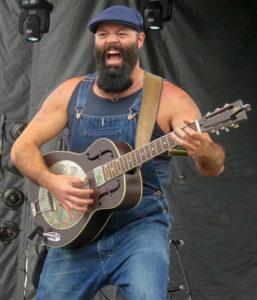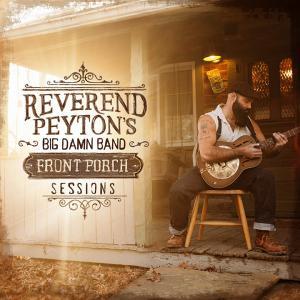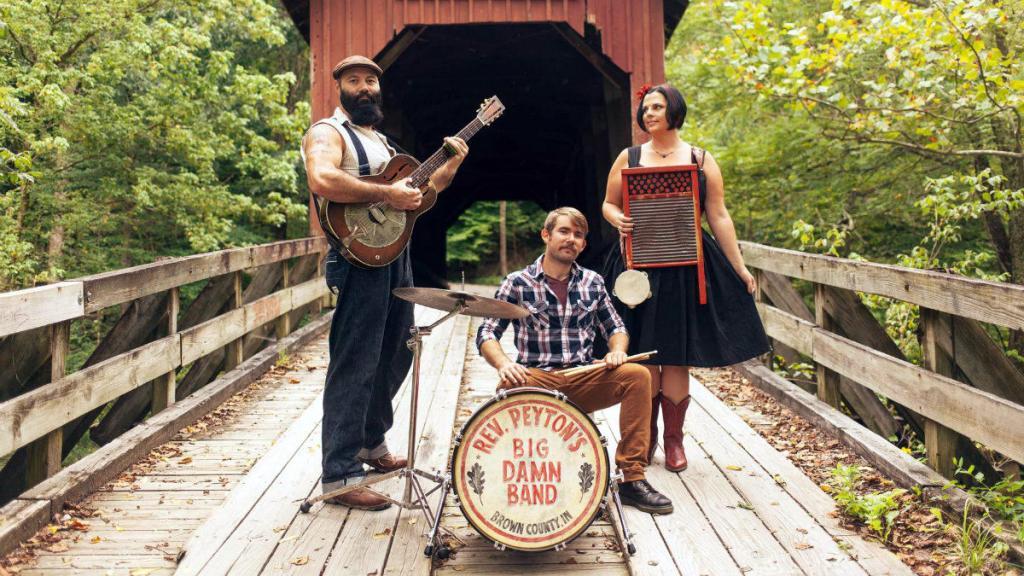Editor’s Note: We recently had a rare sit-down with Reverend Peyton, leader of The Reverend Peyton’s Big Damn Band. In a previous article, we talked with him about their upcoming album, Front Porch Sessions, and World Premiered the single, “One More Thing.” Here, in part two, we talk to Rev about his influences, his thoughts on recording, production, songwriting, and how to save the blues.
 Reverend Peyton is a big man, from rural Indiana. His specialty, with his Big Damn Band, is country blues. With his feet planted firmly on the ground, and his mind focused on the future, he has some strong opinions on how things should, and should not, be done.
Reverend Peyton is a big man, from rural Indiana. His specialty, with his Big Damn Band, is country blues. With his feet planted firmly on the ground, and his mind focused on the future, he has some strong opinions on how things should, and should not, be done.
With the new album, Front Porch Sessions, about to drop, we had a chance to speak with the “Rev” himself. What we were hoping for, were some quick insights into the album. What we got, was a whole lot more.
“We recorded in a studio that’s a converted church,” he begins telling us. “It sits next to a big graveyard, and is shaded by the oldest tulip poplar in Indiana. When I first saw the tree, it freaked me out. It doesn’t even look like a poplar anymore. They always made log cabins out of poplar, you know, because they’re so straight. But this thing is gnarled and looks like an old maple or oak tree. I saw a picture of the church, taken right after the Civil War, and the tree is in it. It’s already big.”
At this point, one might wonder why the tree seemed to have more of an impact on him, than the studio. In simple terms, it’s how he relates to the world around him. Peyton is a straightforward man. Uncomplicated things, that are long-lasting, impress him most. That goes for music, family, and life.
One of his earliest influences, Charley Patton, was said to have had a voice so powerful, it could be heard 500 yards away, without amplification. The Rev, too, was born with a deep, powerful, instrument. “When I really kind of came into my own, and found my voice, it’s big,” he told us. “For me, it’s always been kind of a battle. I always say my voice is like wrestling a bear. It’s big, and powerful, and it’s really taken me a while to feel comfortable in it. If you put a microphone right in front of my face, you won’t hear what’s happening to my voice in that room. You don’t get all the power and nuances. If I’m singing in a studio, you have to make sure there’s a microphone kind of far away too. You take those old Charley Patton recordings. He stood there, singing and playing as loud as he could into one microphone. Then all of that, that was happening in an old analog machine, was being scraped into a wax cylinder. There was a lot happening there. It made his acoustic guitar sound more electric. It took his voice and just spread it out. That’s what analog tape does. That’s what ribbon mics do. That’s what tube amps do.”
A staunch believer in old school methods, and technology, he explained what he meant. “The way I like doing things, the ways I gravitate toward, and the ways that have always seemed to work best for me, are older ways. There’s all kinds of things you can do with music now, to make it sound perfect and clean. I think that messes it up a little bit. Like tube amps. You can plug into a really clean, solid state amp, but why does everyone think that a tube amp sounds better? It’s just old technology and technically, it sounds worse. But, it’s all of that color. It’s all of what’s happening to the notes in a tube amp. That’s why, almost universally, people say, ‘that’s better.’ I like ribbon mics. Old 1930s style microphones. You listen to that and might think, yeah, this really expensive condenser sounds nice, and clean, and big, but, I like what this old microphone is doing to it. To my ears, it sounds better. As we get away from things like that, we realize that the old way sounded better.”
 And it’s not just the recording equipment he’s talking about. “Vinyl is making a huge comeback. I was one of those people that by the time I was listening to music, vinyl wasn’t a thing. It was all CDs and stuff. I mean, I was born in the 80s for God’s sake, so I came into vinyl later. During the resurgence, people were all saying, ‘vinyl is better,’ and I wondered if it was true. Well, when I first got to hear a vinyl record on a good stereo, I was convinced. It actually is better. There are scientific reasons as to why, but I don’t think your ears care what the scientific reasons are. You can talk all day about the hertz scale, and the roll-off, but no one cares really. They just want to know if it sounds better or not.”
And it’s not just the recording equipment he’s talking about. “Vinyl is making a huge comeback. I was one of those people that by the time I was listening to music, vinyl wasn’t a thing. It was all CDs and stuff. I mean, I was born in the 80s for God’s sake, so I came into vinyl later. During the resurgence, people were all saying, ‘vinyl is better,’ and I wondered if it was true. Well, when I first got to hear a vinyl record on a good stereo, I was convinced. It actually is better. There are scientific reasons as to why, but I don’t think your ears care what the scientific reasons are. You can talk all day about the hertz scale, and the roll-off, but no one cares really. They just want to know if it sounds better or not.”
Then, there’s the music. The actual focal point. The reason that artists, of all genres, do what they do. For Rev, again, the simpler, the better. “I’ve had a lot of people tell me, ‘well, you don’t really play blues,'” he shared with us. “My response to them is, well, I guess Taj Mahal doesn’t really play blues either. People get so beholdin’ to, blues has to be 12 bars, and turn arounds, and triplets, and na-na-na. If it ain’t that, then they don’t know what it is. You go back to Charley Patton, and you listen to what he was all about, and it just runs the gamut. I long for the days when the blues had fewer rules. In the pre-war days, people had fewer rules and were just making music that they thought was cool. R.L. Burnside said, ‘blues ain’t nothin’ but dance music.’ I believe that. All American music, blues, jazz, rock ‘n’ roll, country, hip-hop, it all makes people want to dance and feel good. They want a song to make them feel something. They want a song to speak to them.That’s what I love about Taj Mahal. He’s always done what he thought was cool. His feel is amazing. His songwriting is great. He has a mastery of music. He’s someone I admire a lot.”
With blues music splitting into dozens of sub-genres, does Rev believe it will last? His answer is as no nonsense as it gets. “I’ve always said this, and I’ll say it to you now. There is no blues society that can save blues in America. There is no foundation that can save blues in America. The only thing, that can save blues in America, is blues artists making music that people want to listen to, and play. Then, put on a show that people want to come to see. That’s it. I had to learn this the hard way. ‘Music people’ listen differently than people who are just fans of music. A fan of music won’t say, ‘oh man, they played the minor third there on the fourth, what an interesting turn.’ They say, ‘I like that, or I don’t.’ Ultimately you have to make new, good music. I like to hear people put a fresh spin on something. More than that, I like people to tell me their story, in a song. In blues, that’s what we have to do if we want it to keep going. We need to make music that’s true to the roots of things, but is new at the same time. Hopefully, blues in America wises up and gets back to the roots of things. Artists that are out there doing fresh, interesting things, should be championed. It has to be music that people want to listen to. Nothing else matters. That’s the truth.”
More than just in music, Peyton strives to bring those values into everyday life. He told us, “I think one of the goals of being a human, is to wake up every morning just trying to be better, in whatever it is you do, and whoever it is that you are. When you stop doing that, I think is when you start to get old, and start to wither away. Me, I’m still learning. I can promise you one thing. Anything I do is going to be true to my heart. I’m not going to do anything just because I think it might sell a record. The only thing I’ll ever release is going to be hand-made, from the heart stuff.”
 “Over the years, I’ve encountered certain artists, that just love music, even though they’ve been at it for a long time,” he says with dogged determination. “I just hope that when I’m an old man, that I still feel the same way. My best record hasn’t been recorded yet.”
“Over the years, I’ve encountered certain artists, that just love music, even though they’ve been at it for a long time,” he says with dogged determination. “I just hope that when I’m an old man, that I still feel the same way. My best record hasn’t been recorded yet.”
He left us with something that should resonate with artists of all types. “If you like real, from the heart, hand-made music, made by people, about people, then we are definitely a band for you. There’s no putting on airs, there’s no pretending this, that, or the other. We don’t have a scene. There’s no dress code at our shows. I’m really proud of that, and I’m going to keep on doing it. I guarantee. Handshake, pinkie swear, hand on a Bible, for as long as I’m doing this, it’s all we’re ever going to do.”
Amen


